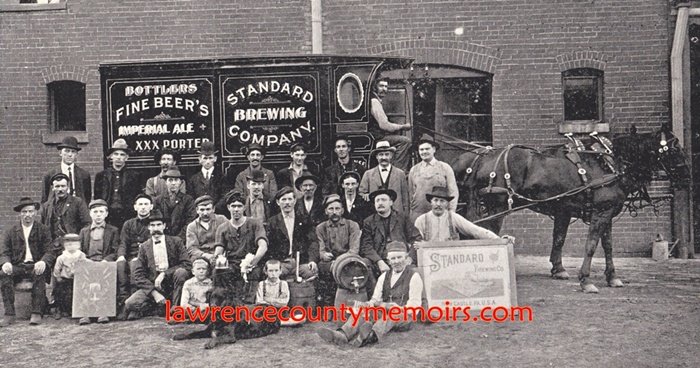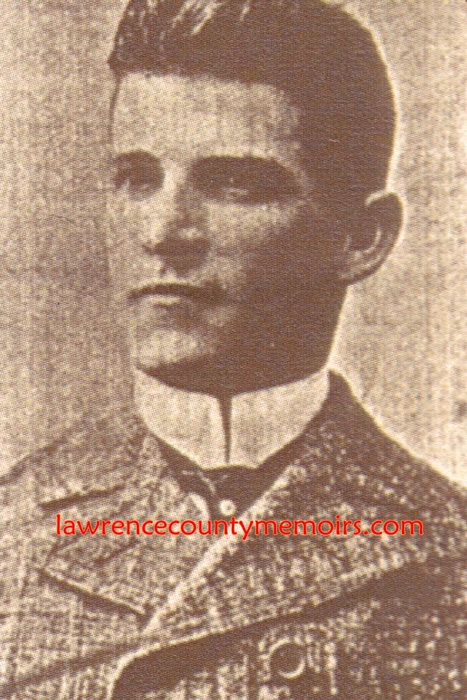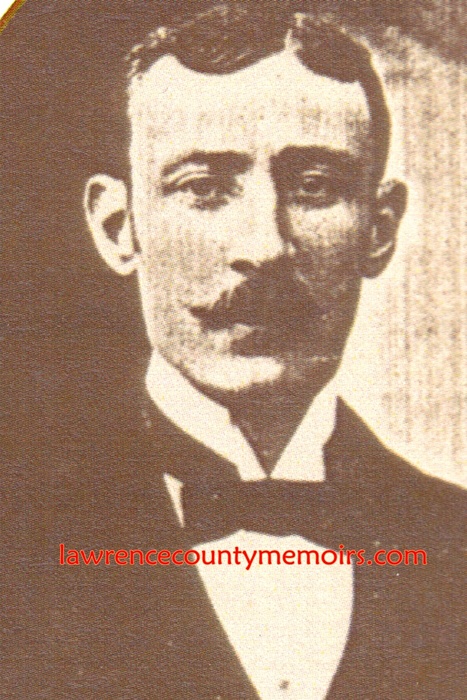In about 1850 the West Side Brewery, operated by Jacob Genkinger and Adam Treser, was founded along the Shenango River in New Castle, Pennsylvania. It was located below the West Washington Street Bridge and somewhere adjacent to Greenwood Cemetery. It was a struggling venture and was sold several times in the coming years. It was eventually seized by the County Sheriff in 1895.
In late 1897 a group of local businessman bought the West Side Brewery and reorganized its assets into a new company to be known as the Standard Brewing Company. The organizers were led by co-owners George W. Lamoree and Louis Eschallier, though the latter was soon succeeded by Marcus Feuchtwanger. Lamoree, of Buffalo, New York, was previously involved in the steel industry, while Feuchtwanger was a successful businessman hailing from New York City. Other prominent executives included Elza O. Haun, a local businessman, and Henry Grotefend, who hailed from a long line of German brewmasters. A large bottling works, costing about $400,000, was erected on Sampson Street in 1897-1898 and was soon producing fine beer for sale to local saloons and hotels. The ensuing history of the Standard Brewery Company would be turbulent to say the least.
The “drys” and the “wets” had been embroiled in an intense battle over the issue of alcohol manufacturing and consumption for many years. In early 1911 the entire county anxiously awaited a ruling by Lawrence County Judge William E. Porter, elected by the anti-saloonist movement back in 1904, on whether to re-grant liquor licenses to local businesses. Porter soon denied all licenses and forbid the county-wide manufacture and sale of alcohol beginning on April 1, 1911. This was a startling victory for the temperance movement. New Castle became the largest “dry” town in the entire state and hotels, saloons, breweries, and other establishments suffered immensely. Standard Brewery was one of three breweries in Lawrence County, the others being the New Castle Brewery and the Spring Brewery in Chewton.
A legal battle ensued and was a major story. The Standard Brewing Company soon got a federal liquor license allowing it to manufacture and sell beer outside the state of Pennsylvania. In February 1912 the company obtained a state license allowing it to sell beer in Pennsylvania but only outside of Lawrence County. Finally, in April 1916, newly elected Judge Samuel P. Emery once again turned the county “wet” as liquor licenses were granted for the first time in five years. Standard Brewery was back in regular business throughout Lawrence County.
The temperance movement continued to gather steam on a national level. The Eighteenth Amendment of the U. S. Constitution, which took effect on January 17, 1920, effectively established the national prohibition of alcoholic beverages by making it illegal to manufacture, transport, or sell beer and liquor. The federal laws did allow for the manufacture of “near beer,” containing less than 0.5% of alcohol. However, in Pennsylvania the strict “Brooks Law” of May 1887 authorized various restrictions and prevented the sale of any alcohol without a state-issued liquor license.
Prohibition essentially forced all major breweries out of the alcohol business. In March 1919 the Standard Brewing Company was reorganized as the Standard Products Company, with the intention to produce soft drinks, dairy products, and bulk ice. In early 1921 Judge Emery issued the company a license to manufacture and sell “near beer.” Soon after this, in May 1921, Marcus Feuchtwanger sold off his considerable interests in the company and retired. Feuchtwanger, a well-respected Jewish community leader, helped establish the Temple Israel congregation in 1926 and also served on the Board of Directors of the Margaret Henry Home for Children from 1921-1944.
On Saturday, June 18, 1921, Internal Revenue agents, investigating a bootlegging operation, raided a rail yard near Pittsburgh. On a Pittsburgh & Lake Erie Railroad (P&LE) train they found about 130 barrels of beer believed to have originated at the Standard Products plant in New Castle. A month later the Standard Products officials reached an agreement with federal government officials and paid $24,000 in taxes and penalties.
Things were quiet for some time until Friday night, January 29, 1923, when a swarm of law enforcement officials, led by County Detective Jack Dunlap, raided the Standard Products plant on Sampson Street. Brewery employees were caught loading barrels of beer onto a train in the rear of the plant. A scandal ensued and as expected a major legal battle erupted. A grand jury took up the case and returned indictments against twenty-two employees of the Standard Products Company, including President George W. Lamoree, Vice President Elza O. Haun, Brewmaster Henry Grotefend, and Engineer Albert F. Grotefend Jr. The case was very sensational as the four executives were prominent members of the local community and well involved in civic affairs.
A trial got underway for these four men in March 1923, but the case was halted when the jury could not reach a verdict after fifty hours of deliberations. The company was ordered to pay hefty fines in excess of $58,000. A new trial commenced in September 1923, but once again the jury could not reach a verdict. A third trial, which featured a sequestered jury, was held in December 1923 and finally resulted in convictions against Lamoree, Haun, and Henry Grotefend. Albert F. Grotefend Jr. was acquitted. Sentencing for the three men was scheduled for late March 1924. Meanwhile, on January 6, 1924, the company was officially dissolved and its property and equipment came under city control for the time being.
Prior to the sentencing, Lamoree, at the age of sixty-six, passed away after a sudden illness in late February 1924. Among the pallbearers at his funeral were such esteemed men as Dr. Robert A. Wallace, Frank S. Hoyt, O. J. H. Hartsuff, Harry S. Wirsing, Charles P. Byers, and Marcus Feuchtwanger. Lamoree was buried in a prominent location in Oak Park Cemetery.
On March 27, 1924, Haun and Grotefend were each sentenced to ten months in prison in the Allegheny County Workhouse and ordered to pay fines of $1,500 plus court costs. They appealed their convictions all the way to the Supreme Court of Pennsylvania, which refused to hear the case after consideration in March 1925. On March 25, 1925, Haun and Grotefend turned themselves in at the county courthouse, where Judge Emery formally enacted their sentences. That same day Deputy Sheriff Frank Johnston transported the two men to the Allegheny County Workhouse to begin their prison sentences. In November 1925, after serving almost eight months of their sentences, Judge Emery acted on a petition from local citizens and ordered an early release for Haun and Grotenfeld.
In April 1926 the City Council held a public hearing to decide on a proposal by a local man to open a slaughterhouse at the old Standard Brewery plant. Local residents banded together and the proposal was defeated. A rash of incidents of theft and vandalism at the abandoned site resulted in the arrest of five teenagers in June 1926.
Finally, in October 1928, the property and all equipment was sold to the New Castle Lumber and Construction Company, located on South Mercer Street and owned by Andrew Dietterlie Sr. Dietterlie, wanting to expand his business, renovated the old facility and soon relocated his business there. The company filed for bankruptcy in August 1932 and the former brewery was abandoned once again.
By the end of 1932, with the winds of political change, it was evident that national Prohibition was probably going to end sometime in the near future. Businessmen once again began to take an interest in acquiring old breweries. In early 1933 the old brewery on Sampson Street was purchased by a group of investors and reopened as the Union Brewery Company, led by President Louis G. Genkinger – a member of the City Council and President of the Chamber of Commerce. Elza O. Haun and Albert F. Grotefend Jr. also joined the new company. The facility was immediately renovated and stocked with all modern brewing equipment.
The new company received a federal license and began manufacturing “near beer” in the summer of 1933. Prohibition finally came to an end when the Eighteenth Amendment was repealed on December 5, 1933, allowing each state the right to decide how best to regulate the manufacture and sale of alcoholic beverages. Pennsylvania Governor Gifford Pinchot, a staunch “dry” advocate, set up the Pennsylvania Liquor Control Board, which strictly regulated public access to alcoholic beverages.
Despite the strict regulations the Union Brewery was able to commence with the manufacture of regular beer and enjoyed success. In 1940 the company began manufacturing canned beer with its signature brand known as “Royal Bru.” The company, facing increased competition from the large breweries such as Anheuser-Busch beginning in the 1940’s, was forced to close its doors in late 1947. The contents of the brewery were soon sold off.
In early 1950 an RCA Service Center, which sold and serviced RCA televisions, opened an office in the old brewery until moving to Ray Street two years later. In late 1952 the Reliable Lumber & Supply Company purchased and occupied the property. Many of the old buildings, including the six-story brewhouse, were torn down in the summer of 1959 to make room for a new four-lane stretch of Route 422 along Sampson Street.
Apparently, a legend implied that the old cornerstone, laid on December 31, 1897, contained a valuable piece of treasure. The New Castle News of June 11, 1959, reported, “Rumor, or legend, had it that a $20 gold piece was imbedded in the 500 pound hunk of limestone. So foreman Larry Darkins, of Pittsburgh, working with the Charles Rice, Inc., firm, thinking it true, went diligently to work. For about an hour he chipped, wiggled and finally broke the solid block loose. He and another worker managed to roll it off its foundation… Looking it over, there was no sign of the usual metal box containing relics for posterity. “There must be something here,” Darkins remarked, wiping perspiration from his face, he turned to the base stone, the one beneath the corner stone, and began chipping at it. It broke away easily. The two men began scrapping it, searching for the gold piece. Darkins suddenly picked up a small, dark piece of metal. “This ain’t a gold piece, is it?” he asked handing it to a reporter on hand for the historic event. Nervous fingers quickly cleaned the surface revealing – you guessed it – a 1896 Indian head penny… which, according to a coin collector nearby, is worth exactly, yep, one cent. “You mean, I worked that hard for a penny?” Darkins asked.”
All that remains today of the Standard Brewery are a few of the smaller buildings, including the old ice house, along Business Route 422. The Reliable Lumber Company is still in operation at the location today.
 The Standard Brewing Company was founded in 1897, when George Lamoree and an associate purchased the assets of the defunct West Side Brewery. About a year later the company built this new brewery (shown above) along Sampson Street. This plant produced beer for wholesale to saloons and other establishments. The brewery was involved in a major scandal during the Prohibition era when its employees were caught selling illegal alcohol in early 1923. (c1905) Full Size |
 A group of employees (and some of their children) of the Standard Brewing Company pose for a photo. (c1909) Full Size |
 |
 The Standard Brewing Company was dissolved in January 1924 in the midst of the illegal alcohol scandal. The property later served as the home of the Union Brewery Company from 1933 until it was closed in 1948. (c1910) Full Size |
 In 1952 the old brewery became the new home of the Reliable Lumber & Supply Company, which still occupies the site today. Many of the old buildings, including the tall brewhouse, were torn down in the summer of 1959 to make room for the expansion of Sampson Street/Business 422. (May 2014) Full Size |






Comments
James E Cooper #
I remember playing in the old brewing co. When I was a kid .lived in the old cooperage barrel co.and was playing hide and seek.ride the old elevator to the top floor.and catch the pigeons .sure brings back old times.
Kevin Pipes #
I found an old silver match box advertising standard beer in Newcastle pa. There is also a commemerative
copper stein In the estate. It was awarded to standard brewery and one of the brewmeisters from the national organization. I will try to take photos and forward them to you.
I enjoyed your historical account and stumbling onto
Marcus feuchtwanger one of the early owners. His decedent of the same name lived on my block a few doors away. They passed and hence the estate sale where the standard brewery objects were. I’m going back today to look at the stein. There were numerous gold and silver coins of the same period as well as nice jewelry. There are objects of four generations including photos.
Any feedback or interest in discussion appreciated.
Kevin pipes
Linda Grotefend Dilbeck #
Henry Grotefend was my great uncle and Albert Grotefend was my grandfather. Henry’s house is right across the street from the historical society and his brother Albert Charles my great grandfather lived right around the corner.
Thompson Harkins #
Does anyone know how much old bottles from this company are worth.
Comment